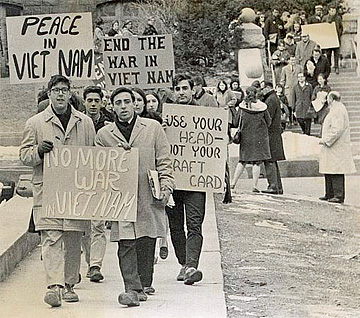Yesterday, I suggested that we make peace in the world, first of all, by announcing the peacemaking work of Christ on the cross. Second, we bring God’s peace to the world by holding up the cross of Christ as an example to emulated. Today I’ll offer two additional aspects of peacemaking in the world.
Third, we extend divine peace into the world by living peaceably each day: “Do your part to live in peace with everyone, as much as possible” (Rom 12:18). Notice that we are to live peaceably with “everyone,” those inside the church and outside of the church, those in our families and those at our workplace, the servers who wait on our tables with extra consideration and the “stupid idiots” who cut us off in the parking lot.
This is, of course, much easier said than done. It’s not all that demanding to tell others, especially if they’re geographically far away from us, what they need to do to live in peace. But it’s really quite challenging to live peaceably with others each and every day.
Fourth, we bring God’s peace to the world by seeking his righteousness and justice. Jesus tells us to “seek first the kingdom [of God] and his righteousness/justice” (Matt 6:33). Most translations refer only to God’s “righteousness,” but the Greek word carries both connotations. Jesus maintains the Jewish interconnection of righteousness, justice, and peace. We would expect as much from Jesus, since he is the fulfillment of Isaiah’s prophecy as the Prince of Peace who will rule forever with “justice and righteousness” (Isa 9:6-7). He is the one who brings good news to the poor, release to the captives, and freedom to the downtrodden (Luke 4:18).
In practical terms, how do we seek God’s righteousness and justice? We treat all people with respect and dignity, even and especially those who are most helpless and defenseless. We make sure our practices and policies reflect God’s revealed values, even when we operate in “the world.” We use the power and opportunity given to us to be people of biblical justice. We don’t turn the other way when we see injustice, but invest our energies so that God’s justice and righteousness might take form in and ultimately transform our world.
 This last activity, doing justice in the world, has been the cause of considerable debate and conflict among Christians. When I was young, I watched Christians pummel each other verbally over American involvement in Vietnam. For some, a Christian commitment to peace demanded immediate withdrawal. For others, Christian values required that we free the South Vietnamese from the domination of communism. In the 1980s, I had Christian friends who protested against the American nuclear arms build-up, even to the point of being arrested in acts of civil disobedience. I had other Christian friends who committed their professional lives to helping the U.S. make nuclear weapons. They did this conscientiously, believing that their efforts would further the cause of peace in the world. Within contemporary society, some Christians focus their efforts on justice for the unborn, while others ignore this issue altogether, claiming that racial injustice deserves our primary attention.
This last activity, doing justice in the world, has been the cause of considerable debate and conflict among Christians. When I was young, I watched Christians pummel each other verbally over American involvement in Vietnam. For some, a Christian commitment to peace demanded immediate withdrawal. For others, Christian values required that we free the South Vietnamese from the domination of communism. In the 1980s, I had Christian friends who protested against the American nuclear arms build-up, even to the point of being arrested in acts of civil disobedience. I had other Christian friends who committed their professional lives to helping the U.S. make nuclear weapons. They did this conscientiously, believing that their efforts would further the cause of peace in the world. Within contemporary society, some Christians focus their efforts on justice for the unborn, while others ignore this issue altogether, claiming that racial injustice deserves our primary attention.
I can’t begin to resolve these complex issues here. But let me offer a few words of guidance. Even though the relationship between Christian peacemaking and political activism can be confusing, we may not forget about it. Scripture calls us to make peace in every dimension of life and to seek justice in this world. Many peacemaking actions are clearly taught in Scripture and therefore require little debate. Feeding the hungry, building a home with Habitat for Humanity, sponsoring a child through World Vision, embracing someone from an ethnic background other than your own, caring for inmates through Prison Fellowship – all of these actions and countless more are clearly biblical (see, for example, Matt 25:31-46). Invest yourself in doing that which God obviously favors, without spending all your time debating the difficult issues and doing nothing tangible.
When it comes to the tricky issues, however, and we all must face them, let me urge you to seek God’s wisdom in Scripture. Many advocates of social causes, including many Christians, do not ground their efforts in God’s Word. Thus they easily go astray, either in goals or in strategies, and usually in both. Usually, when we seriously try to discover God’s will for a particular issue in Scripture, we’ll discover that our assumptions and biases and commitments need to be adjusted in light of God’s truth.

